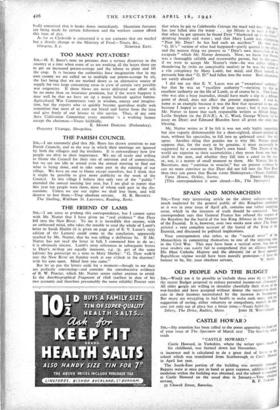THE FRIEND OF LAMB
SIR,—I am sorry to prolong this correspondence, but I cannot- agree with Mr. Nutter that I- have given no " real evidence " that Dyer fell into the New River. To me it is incredible that anyone, with an unbiassed mind, who takes the trouble to read the whole of Lamb's letter to Sarah Hazlitt (it is given on page 405 of E. V. Lucas's 1935 edition of the Letters) could come to the conclusion, apparently reached by Mr. Nutter, that he was telling a deliberate lie. If Mr. Nutter has not read the letter in full, I commend him to do so ; it is obviously sincere. Lamb's stray references in subsequent letters to Dyer's m;shap are equally innocent, e.g. (p, 407 of the same edition) his postscript to a note to Mary Shelley: " G. Dyer walk'd into the New River on Sunday week at one o'clock in the daytime! with his eyes open. Mind how you come."
But let us put the letters aside for a moment—though to me they are perfectly convincing—and consider the corroborative evidence of B. W. Procter, which Mr. Nutter seems rather anxious to avoid. In the Autobiographical Fragment of 1828 (earliest in date of his two accounts and therefore presumably the more reliable) Procter says that when he got to Cokbrooke-Cottage the maid told him " Mr. Dyer has just fallen into the water . . . my Missis is in such a Yrighe4, that when he got upstairs he found Dyer " blanketed up to the throat,.: drinking brandy -and water ; and that Mary Lamb was whimpering "Poor Mr. Dyer! he has haesuch an accident." He then gives "-G. D.'s " version of what had happened—partly quoted in my article, and the nearest thing we possess to " Dyer's own description of the escapade " which Mr. Nutter demands. Now, we know that Promr was a thoroughly reliable and trustworthy person, but in this case_ if we were to accept Mr. Nutter's view—he was either telling thundering lie (with no conceivable motive) or he was the victim a vile conspiracy by Mary Lamb; her maid, and Dyer himself. to persuade him that " G. D." had fallen into the water. Both alternatives are surely absurd?
I did not say that E. V. Lucas was an " exceptional authority," but that he was an " excellent authority "—meaning by that an excellent authority on the life of Lamb, as of course he is. That Lucas, who was also a busy journalist, should have made a slip in a different point of detail, does not affect the present argument. I took his name as an example because it was the. first that occurred to me, and because I hoped to save a little of your space ; but it may interest Mr. Nutter to know that such responsible writers as Alfred Ainger, Leslie Stephen (in the D.N.B.), A. C. Ward, George Wherry (in his essay on Dyer) and Edmund Blunden have all given the story their blessing.
Mr. Nutter writes' as if he felt it was not only highly improbable but also vaguely dishonourable for a short-sighted, absent-minded old man, without his spectacles, to fall into an nnfenced canal: few will agree. Another thing that puzzles me is why Mr. Nutter should suppose that, for the story to be genuine, it must necessarily be supported by a statement in Dyer's own hand. The Dyers of this world- are superior to their eccentricities ; they move from one book- shelf to the next, and whether they fall into a canal on the way, or, not, is a matter of small moment to them. Mr. Nutter, like the Baconians, may " continue to wonder," but on present evidence he can no more convince us that Dyer did not fall into the New River than they can prove that Bacon wrote Shakespeare.—Yours faithfully,
[This correspondence is now closed.—En., The Spectator.] •


























 Previous page
Previous page